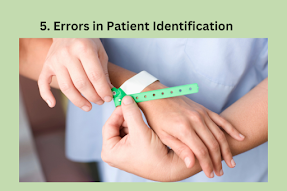Typical Nursing Errors and How to Prevent Them
Typical Nursing Errors and How to Prevent Them
The challenging field of nursing necessitates accuracy, compassion, and prompt decision-making. But mistakes can be made by even the most seasoned nurses. In order to ensure patient safety and professional development, it is essential to comprehend frequent nursing errors and how to avoid them.
1. Mistakes with Medication
Error
giving a patient the incorrect medication, the incorrect dosage, or both.
Ways to Prevent It:
When administering medication, remember the ten rights: the right patient, the right drug, the right dose, the right route, the right time, the right education, the right assessment, the right to refuse, the right to refuse, and the right to evaluation
Verify prescriptions and labels twice.
For verification, use barcode scanning and electronic medical records (EMRs).
2. Inadequate Records
Error
Legal problems and poor medical care may result from incomplete, erroneous, or delayed documentation.
Ways to Prevent It:
To guarantee accuracy, document in real time.
Make use of language that is objective, succinct, and straightforward.
Steer clear of acronyms that could lead to misunderstandings.
3. A breakdown in communication
Error
failing to interact with patients, physicians, or coworkers in an efficient manner.
Ways to Prevent It:
For handovers, utilize SBAR communication (Situation, Background, Assessment, Recommendation).
Pay attention to what coworkers and patients have to say.
When in doubt, confirm and explain orders.
4. Failures in Infection Control
Error
improper hygiene practices, which might result in illnesses linked to healthcare (HAIs).
Ways to Prevent It:
Maintain strict adherence to hand hygiene precautions.
Make proper use of personal protective equipment (PPE).
Make sure to properly dispose of medical waste.
5. Errors in Patient Identification
Error
treating or performing procedures on the incorrect patient.
Ways to Prevent It:
Always utilize the patient's name and birthdate as two identifiers.
Before beginning any intervention, double-check the patient's wristbands.
Patients should be encouraged to confirm their own information.
6. Disregarding Early Warning Indications
Error
failing to notice little alterations in a patient's state that might point to a more significant problem.
Ways to Prevent It:
Document properly MEWS SCORE, PEWS SCORE, MOEWS SCORE
Conduct comprehensive evaluations and routinely check vital indicators.
If something seems off, trust your instincts and investigate further.
Inform the doctor of any concerns as soon as possible.
7. Safety Risks and Patient Falls
Error
failing to take precautions against accidents and falls in a medical facility.
Ways to Prevent It:
Evaluate each patient's danger of falling.
Make sure the call bells are accessible and the bed is kept low.
Provide fall prevention education to patients and their families.
8. Burnout and a lack of self-care
Error
Neglecting one's personal health can result in exhaustion, burnout, and poorer performance at work.
Ways to Prevent It:
Practice self-care and take regular breaks.
Ask for help from superiors and coworkers.
Use stress-reduction and mindfulness practices.
9. Not Keeping Knowledge and Skills Up to Date
Error
not staying current with the newest procedures and developments in medicine.
Ways to Prevent It:
Participate in workshops and courses for ongoing education.
Keep abreast of new findings and recommendations.
Look for possibilities for professional growth and mentoring.
10. Ineffective Delegation
Error
improperly assigning work or neglecting to oversee assigned responsibilities.
Ways to Prevent It:
Recognize the various healthcare team members' areas of expertise.
Clearly state expectations and tasks.
Always complete the tasks assigned to you.
In conclusion
Although nursing errors can have major repercussions, they can be avoided with the right instruction, close attention to detail, and clear communication. Nurses may protect their professional integrity and give their patients safe, high-quality treatment by being aware of these common mistakes and following best practices.
FAQs
1. What is the most frequent error that nurses make?Among the most common mistakes in nursing are medication errors, such as erroneous prescriptions or dosages.
2. In what ways may nurses enhance communication in medical environments?Communication can be improved by using standardized communication methods like active listening, SBAR, and order confirmation.
3. What are the most important ways to avoid burnout among nurses?Burnout can be avoided by taking care of oneself, establishing boundaries between work and life, and asking coworkers for support.
4. How significant is nursing documentation?Patient safety, legal protection, and continuity of treatment all depend on accurate recordkeeping.
5. How can nurses help hospitals avoid infections?Preventing infections requires strict hand cleanliness, appropriate PPE use, and commitment to infection control procedures.
If something seems off, trust your instincts and investigate further.
Inform the doctor of any concerns as soon as possible.
7. Safety Risks and Patient Falls
Error
failing to take precautions against accidents and falls in a medical facility.
Ways to Prevent It:
Evaluate each patient's danger of falling.
Make sure the call bells are accessible and the bed is kept low.
Provide fall prevention education to patients and their families.
8. Burnout and a lack of self-care
Error
Neglecting one's personal health can result in exhaustion, burnout, and poorer performance at work.
Ways to Prevent It:
Practice self-care and take regular breaks.
Ask for help from superiors and coworkers.
Use stress-reduction and mindfulness practices.
9. Not Keeping Knowledge and Skills Up to Date
Error
not staying current with the newest procedures and developments in medicine.
Ways to Prevent It:
Participate in workshops and courses for ongoing education.
Keep abreast of new findings and recommendations.
Look for possibilities for professional growth and mentoring.
10. Ineffective Delegation
Error
improperly assigning work or neglecting to oversee assigned responsibilities.
Ways to Prevent It:
Recognize the various healthcare team members' areas of expertise.
Clearly state expectations and tasks.
Always complete the tasks assigned to you.
In conclusion
Although nursing errors can have major repercussions, they can be avoided with the right instruction, close attention to detail, and clear communication. Nurses may protect their professional integrity and give their patients safe, high-quality treatment by being aware of these common mistakes and following best practices.
FAQs
1. What is the most frequent error that nurses make?Among the most common mistakes in nursing are medication errors, such as erroneous prescriptions or dosages.
2. In what ways may nurses enhance communication in medical environments?Communication can be improved by using standardized communication methods like active listening, SBAR, and order confirmation.
3. What are the most important ways to avoid burnout among nurses?Burnout can be avoided by taking care of oneself, establishing boundaries between work and life, and asking coworkers for support.
4. How significant is nursing documentation?Patient safety, legal protection, and continuity of treatment all depend on accurate recordkeeping.
5. How can nurses help hospitals avoid infections?Preventing infections requires strict hand cleanliness, appropriate PPE use, and commitment to infection control procedures.
.png)










%20(1).png)


%20A%20Must-Have%20Skill%20for%20Modern%20Nurses.png)





Comments
Post a Comment